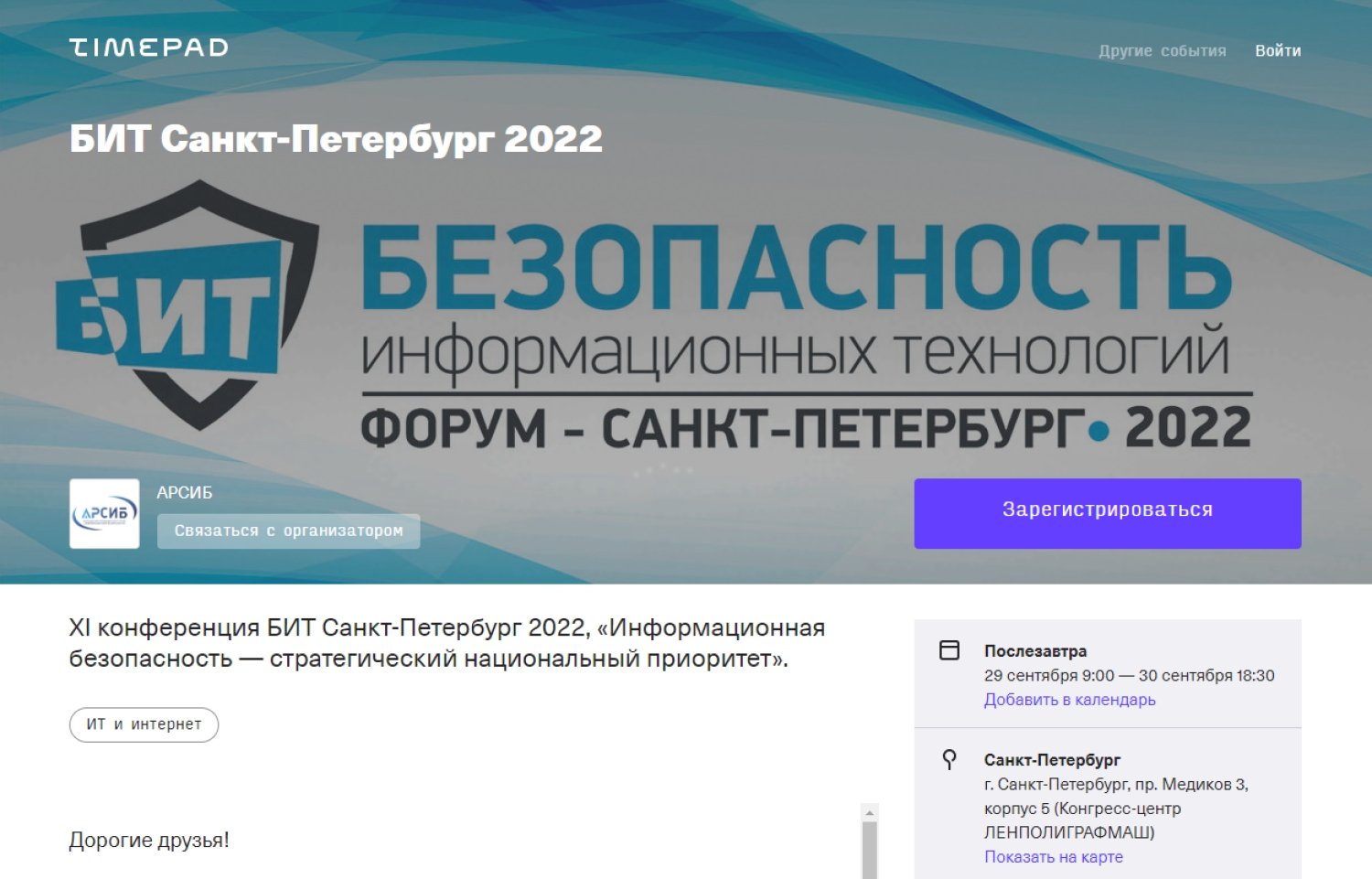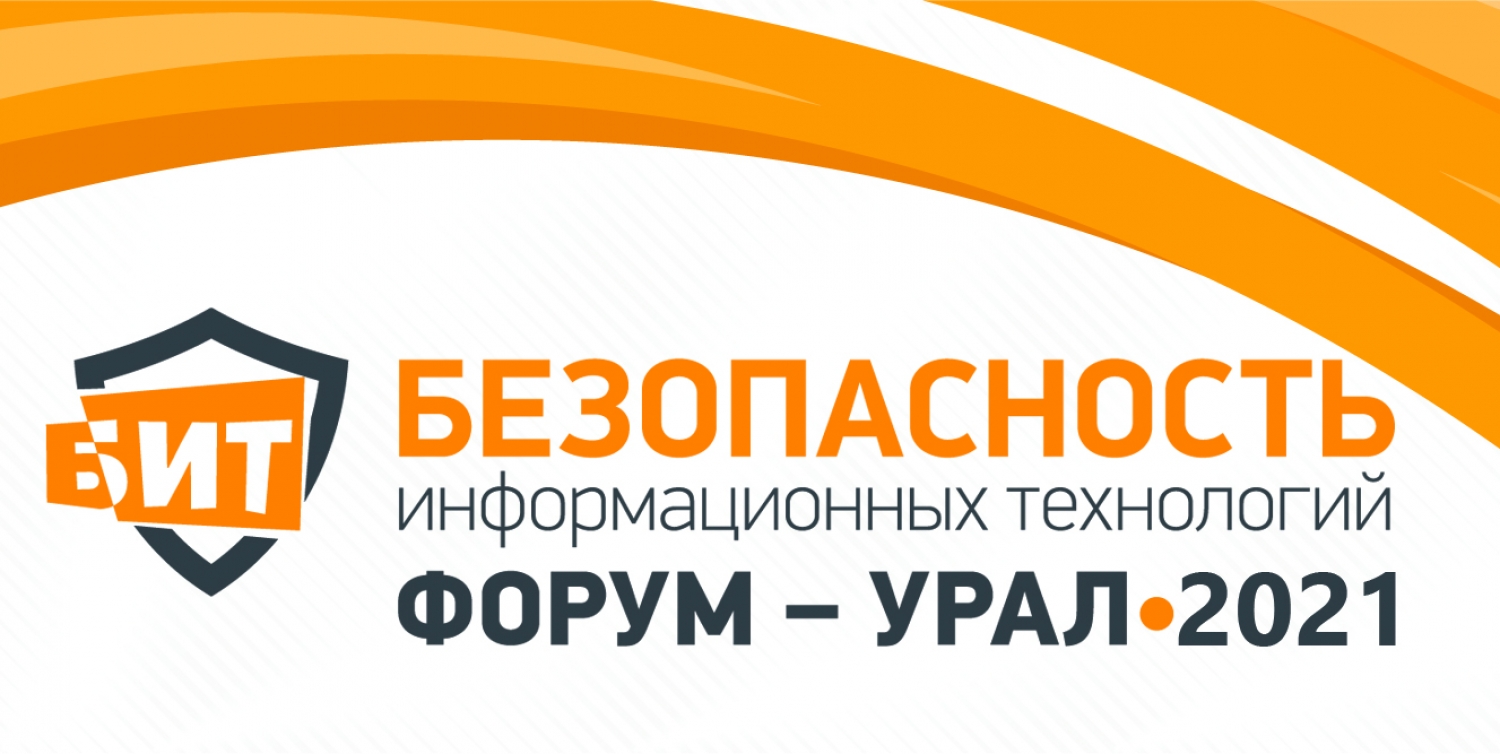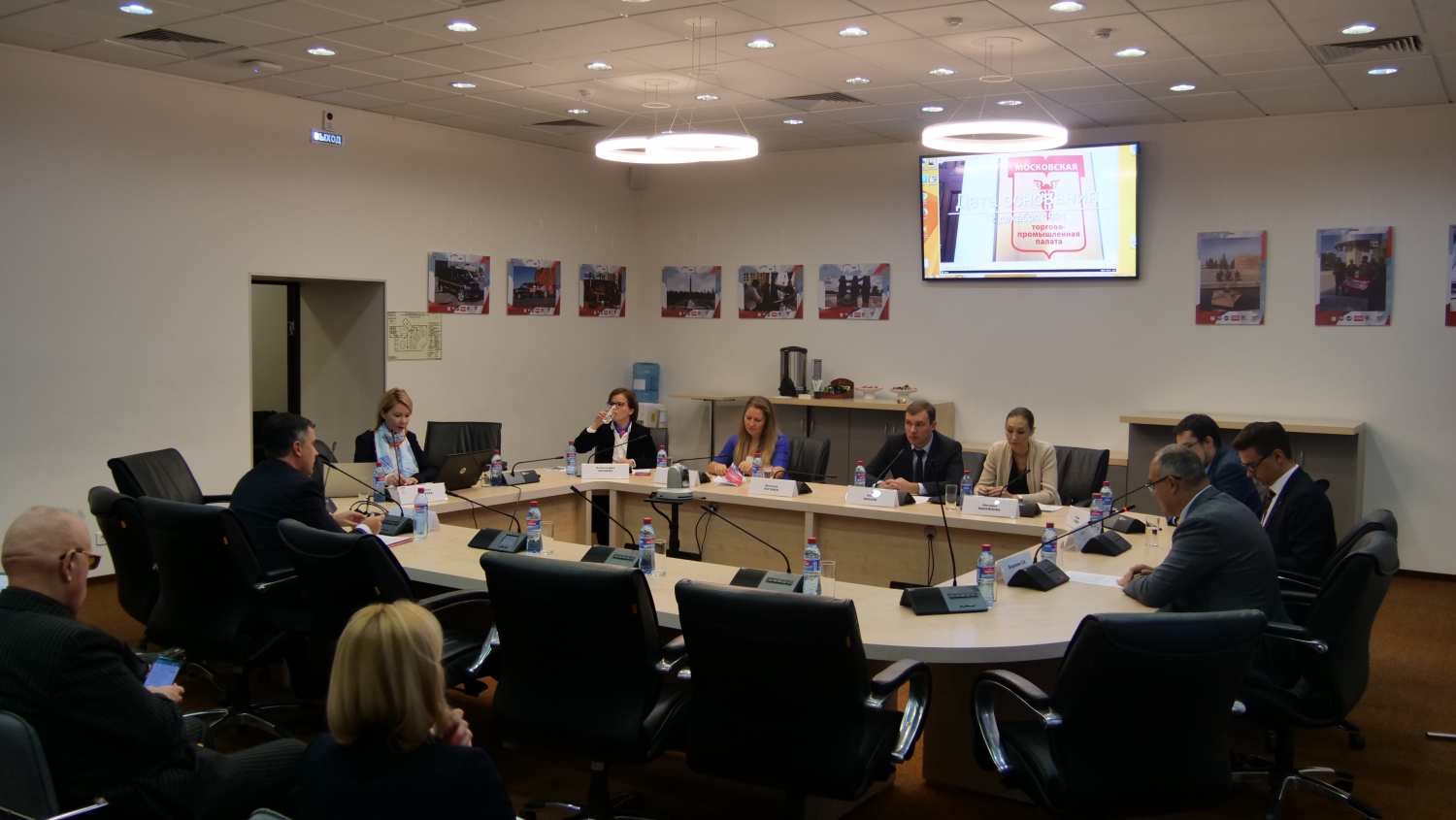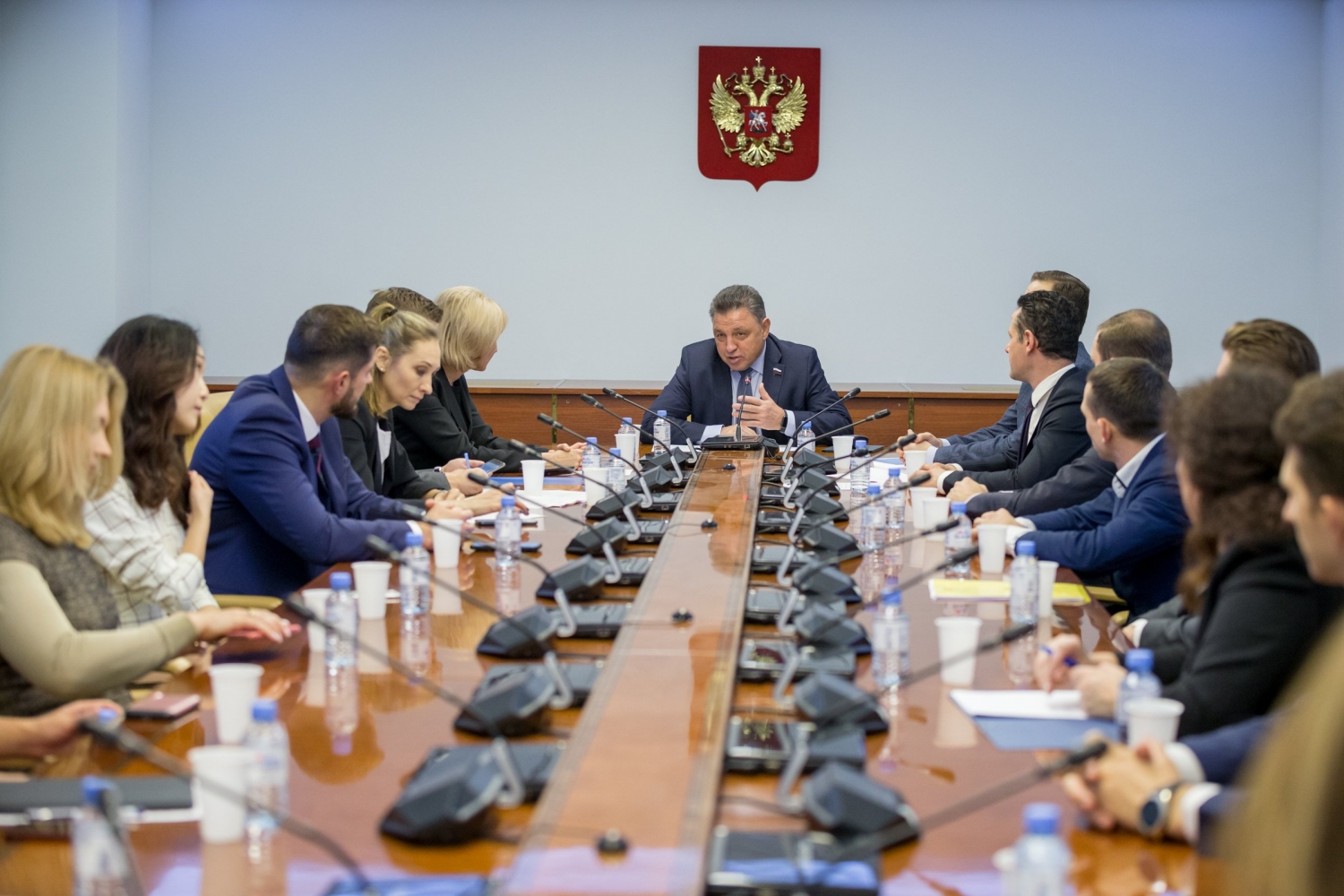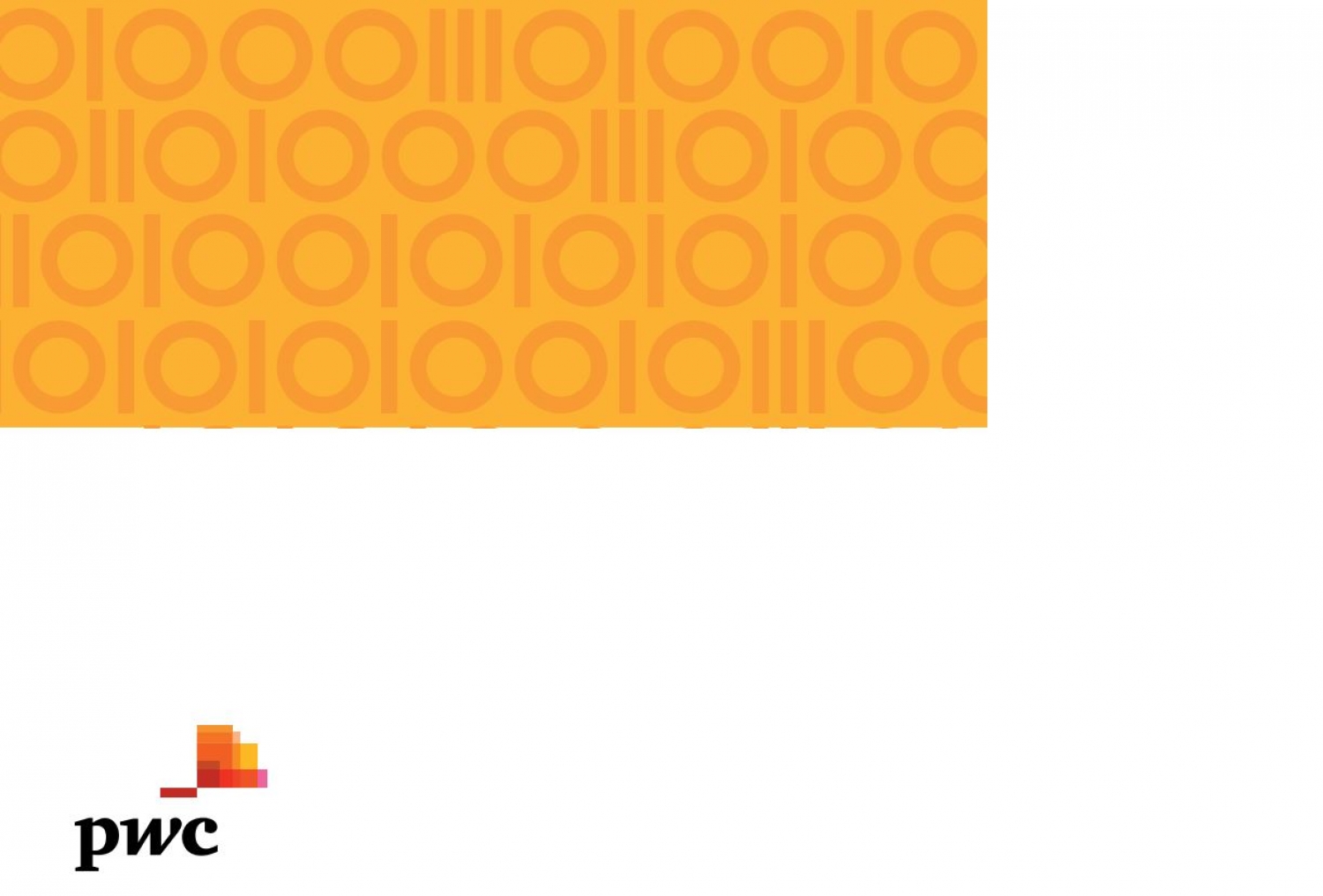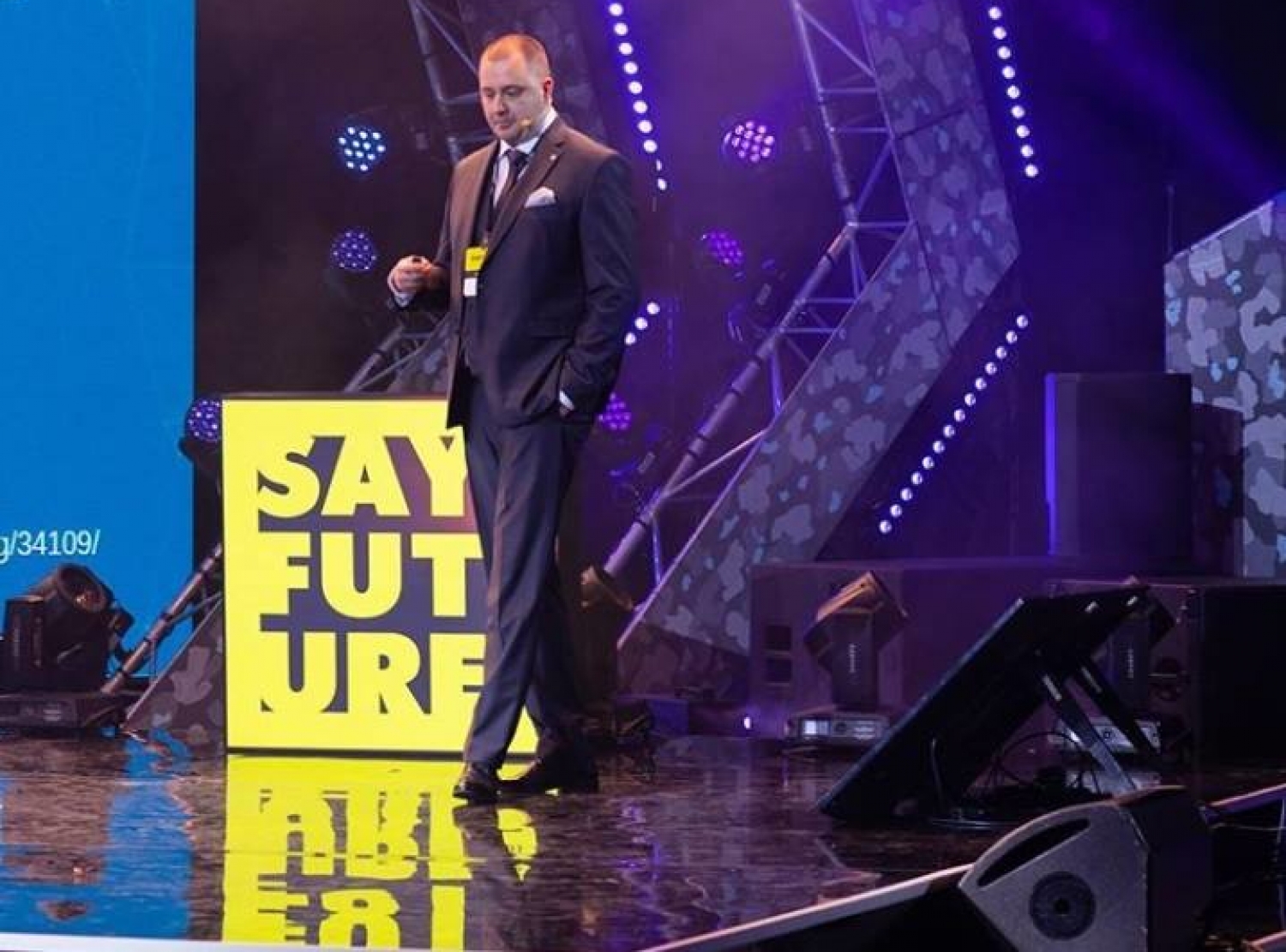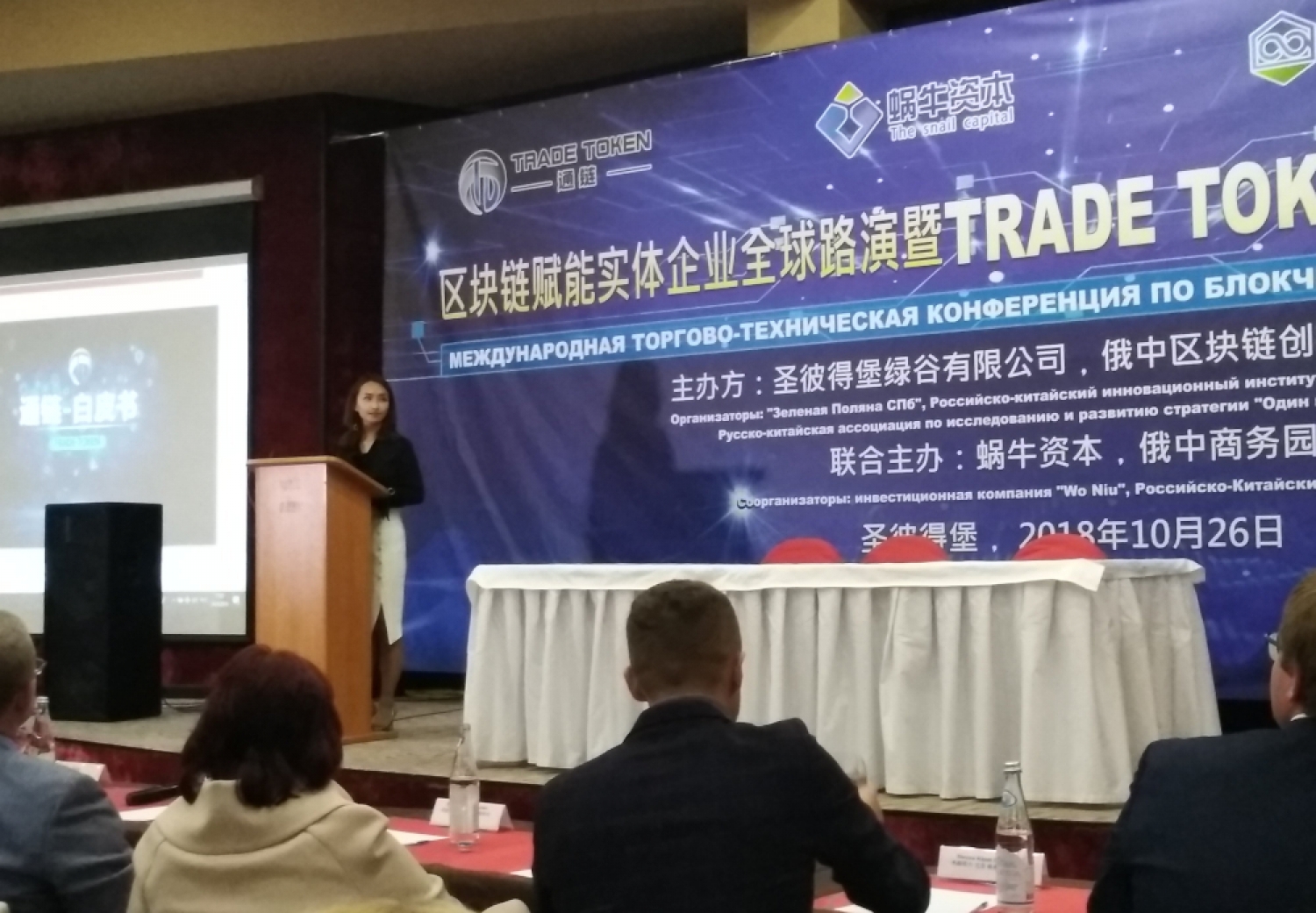
NEW THIS WEEK (8)
ФОРУМ БЕЗОПАСНОСТЬ ИНФОРМАЦИОННЫХ ТЕХНОЛОГИЙ (БИТ) САНКТ-ПЕТЕРБУРГ 2022
Written by Aleksandr Podobnykh29 сентября стартует XI конференция БИТ Санкт-Петербург 2022, Информационная безопасность - стратегический национальный приоритет.
Ключевые тезисы:
* Перспективные технологии информационной безопасности - вектор приоритетного использования отечественных информационных технологий и оборудования.
* Цифровой суверенитет - миф или реальность?
* Будут ли платить штрафы мировые ИТ гиганты?
* Обеспечение безопасности критической информационной инфраструктуры и противодействие компьютерным инцидентам.
* Защита прав российских граждан и организаций при обработке персональных данных с использованием ИКТ.
* Цифровая трансформация - влияет ли ИБ на этот процесс? Как это связано с общим уровнем осведомлённости российских граждан и организаций.
БИТ Санкт-Петербург 2022 проводится в дискуссионном формате и включает в себя доклады на самые острые и актуальные темы. Задача мероприятия заключается в обмене опытом, установлении новых деловых контактов и партнёрских отношений.
Традиционно в первый день для всех участников пройдут: конференция, дискуссия, выставка, круглый стол: "Разговор с регулятором".
Научная секция пройдет 30 сентября в международном образовательном научном центре Университета ИТМО.
Источник: Регистрация
CYBER RESILIENCE FACTORS AT BIT URAL 2021
Written by Aleksandr PodobnykhJust three days before the long-awaited VII conference BIT Ural 2021, organized by the Association of Chiefs Information Security Officer (ACISO), which will take place on April 23 at the Yeltsin Center (after 2 years of separation). The event was organized in strict accordance with the requirements of the prevention of the spread of coronavirus infection.
The theme of the conference will be the factors of ensuring cyber resilience: people and technology. The meeting will be opened by the Chairman of the Board of ACISO, and the Director of the Department of Informatization and Communication of the Sverdlovsk Region will deliver a welcoming speech. Also, leading experts will share their work experience. A round table with the participation of FSTEC (Federal Service for Technical and Export Control), the Bank of Russia and conference partners is also planned.
Key points for discussion: trusted environment - the basis of information security; import substitution vs import matching; domestic vs foreign technologies; certification is a panacea for security or a bluff; CII requirements that people or technology come first; the trend of transition to domestic technologies - myth or reality; GSCSICA (Global System for Collecting and Sharing Information about Computer Attacks - will the market expectations be met.
Source: aciso.timepad.ru
THE ROUNDTABLE PARTICIPANTS LEARNED ABOUT THE FEATURES OF SMART CONTRACTS
Written by Manuylova NatalyaOn November 5, 2019, a round table was held at the Moscow Chamber of Commerce and Industry on the topic: “Electronic Commerce. Smart contracts. New Opportunities of the Digital Economy ”, which discussed the main problems of legal support of electronic commerce.
At the event, the main trends of the digital economy were presented and the state of legal regulation of this sphere was outlined. According to Suren Vardanyan, Vice President of the Chamber of Commerce and Industry, opening the meeting, the Chamber pays special attention to digitalization issues: digital products are being developed that allow entrepreneurs to receive new services, and the Chamber follows the main economic trends. “We try at all the events that take place within the walls of the MCCI to develop specific proposals, which we then pass on to the authorities and all interested departments,” Vardanyan emphasized.
According to Igor Sudets, Deputy Director of the Digital State Development Department of the Ministry of Digital Development, Telecommunications and Mass Media of the Russian Federation, 17 draft laws are currently being drafted to regulate the main directions of digitalization of the Russian economy. In the near future it is expected that the Government will give instructions on the preparation of about 60 more draft laws. For example, the draft law on digital financial assets has already undergone seven editions, but has not yet been submitted to the State Duma. Now the eighth version of the document is being prepared. The total budget allocation for federal projects related to the implementation of digital technologies is 1634.9 billion rubles. The main national programs being implemented now, according to Igor Sudets, are a training program for the digital economy; digital infrastructure creation; digital technology development; digital security; development of legal regulation and the creation of digital state regulation. As for the latter, as stated by the representative of the Ministry of Communications, the basic principle of digital government is “a person does not need to know which authority he interacts with. He sends a request, and the state executes it. " Moreover, according to the expert, “the state itself should come to us”: after some time, every citizen can receive push notifications about what actions he needs to take: pay taxes, replace a driver’s license, etc.
Artem Dalevich, Vice President of the ICIE, spoke about the implementation of the secure transaction mechanism using escrow accounts on the Business Market platform, developed and implemented by the MCCI
Since lawyers made up a large share of the roundtable audience, one of the main topics of discussion was the legal regulation of electronic commerce. Senior Associate at Rödl & Partner Alexandra Nechaeva spoke about the main risks that accompany the conclusion of contracts in online trading. It was, in particular, about the interpretation of the concept of an offer and the moment of its receipt, as well as about the differences between online and distance trading. The speaker emphasized that there is no definition of electronic commerce in the legislative field, which leads to a rather arbitrary interpretation of the electronic commerce process in judicial practice. In addition, Alexandra Nechaeva said that Russia has not developed approaches to determining the jurisdiction of transactions involving foreign elements. Summing up her speech, the speaker noted that “the problems of determining jurisdiction are now one of the first in matters of the digital economy”.
Svetlana Mochalina, head of the risk management department at L'Occitane, spoke about the legal risks of an international company in the retail industry in Russia. A franchise firm defended its interests by registering trademark rights. This almost completely prevented parallel sales.
The topic of the speech of DDC Ltd Director Ilya Mikheev was smart contracts. Since this is a very promising form of digital agreements, the message caused serious interest from the audience. According to the expert, for the first time a smart contract appeared a long time ago - in 1996. “In principle, a smart contract is a computer code that guarantees the fulfillment of obligations subject to all agreed conditions,” the speaker explained. Another important distinguishing feature of a smart contract is that it must be hosted in a decentralized, trusted environment. Such an environment is guaranteed, in particular, by blockchain technology. Smart contracts are already used, for example, in diamond verification.
The representative of the company-operator of fiscal data OFD.ru Dmitry Pogozhev talked about the currently introduced product labeling system, its advantages and disadvantages.
Summing up the round table, the moderator of the meeting, forensic financial expert Natalya Manuylova noted that "the digital economy is not only cryptocurrency and blockchain." The main purpose of the event was to identify the risks that entrepreneurs face in introducing digital technologies, and to outline ways to minimize them, including using compliance procedures.
The Advisor to the President of the MCCI Marina Evteeva thanked all the speakers and participants for the informative conversation and assured that all the proposals that were voiced would be summarized and brought to the attention of the leadership of the chamber.
The event was supported by the Government of Moscow and the Department of Economic Policy and Development of Moscow...
THE FEDERATION COUNCIL DISCUSSED CURRENT TRENDS IN THE LEGISLATIVE REGULATION OF THE DIGITAL TRANSFORMATION OF THE ECONOMY
Written by Manuylova NatalyaThe Chairman of the Federation Council Committee on the Rules and Organization of Parliamentary Activities, Vyacheslav Timchenko, held a round table on the topic "Current Trends in the Legal Regulation of the Digital Transformation of the Economy."
The senator noted that the Federation Council pays great attention to the topic of legal regulation of the digital economy.
“In the upper house of the Russian parliament, an expert advisory body is constantly operating - the Council for the Development of the Digital Economy under the leadership of Deputy Chairman of the Federation Council Andrei Turchak,” said Vyacheslav Timchenko.
According to the parliamentarian, when developing legislative initiatives, it is important to take into account the opinion of the professional and expert communities. “This will create the regulatory framework necessary for the development of breakthrough technologies,” the head of the Federation Council Committee emphasized.
The meeting discussed the legal regulation of the digital economy and services, as well as considered bills that allow the introduction of modern methods in various fields. The participants made suggestions and presented a number of amendments to the documents under discussion.
The discussion was attended by listeners of the program “Legal foundations and legal practices of working with cryptocurrency and blockchain projects” of the G.V. Plekhanov.
During the event, Vyacheslav Timchenko supported a number of initiatives prepared by students in the learning process.
Source: Council of the Federation of the Federal Assembly of the Russian Federation.
CRYPTO INSOLVENCY: 10 THINGS EVERY DIRECTOR OF A CRYPTO FIRM NEEDS TO KNOW WHEN THINGS START TO GO WRONG
Written by Manuylova NatalyaFebruary 2019, while the crypto ecosystem continues to make considerable progress in building out its infrastructure and 'institutionalising' the space, many crypto players are facing challenges due to a broad range of issues, from a fall in cryptoasset prices to more regular start-up challenges.
This is forcing many crypto firms into situations of financial distress. In this article, they set out the ten things that any director or senior executive of a crypto entity needs to know when its solvency status is in doubt.
Download Crypto Insolvency...
ASPIS SA AND GROUP-IB HAVE DEVELOPED A SCORING MODEL FOR ASSESSMENT THE CYBERSECURITY OF CRYPTO-EXCHANGES
Written by Aleksandr PodobnykhThe international cybercrime prevention company Group-IB and the Swiss insurance broker ASPIS SA project - CryptoIns it platform-have developed a scoring model for assessing the cybersecurity of crypto-exchanges. The product allows you to rank the exchange on the degree of protection from external influences and calculate insurance rates of cyber risks for their customers.
The scoring model based on the assessment of Group-IB and CryptoIns specialists will be used in the calculation of insurance tariffs for clients of crypto-exchanges. According to Group-IB, the damage from targeted attacks on the crypto currency exchange in 2017 and 2018 the first nine months of the year amounted to $877 million. During this time it was hacked at least 13 trading platforms.
Security assessment takes Group-IB. Several indicators are taken into account: the level of technical security of the infrastructure, the reliability of key storage, the level of protection of passwords and personal customer data, the ability to withstand potential cyber threats, etc. Evaluation is made both on the basis of open data and with the help of specialized tests (for example, penetration from using social engineering techniques). In addition, an “incident map” is being built, consisting of factual information on all attacks on the stock exchange, attempts at fraud, data compromise, etc. For their part, CryptoIns experts evaluate the dynamics of trading volume, commissions, quality of traded assets and some other indicators.
On the basis of the data obtained, points are calculated that reflect the level of risk of the exchange in terms of potential damage from the activities of cybercriminals. The first group includes reliable exchanges that are least exposed to such risks. To the last, fourth-the most vulnerable. Based on this classification, the insurance rate for the customer is calculated. Insurance covers the risk of complete termination of the crypto-exchange as a result of hacker attacks and fraud on the part of employees and founders of the crypto-exchange. The insurance certificate is issued by a licensed insurance company Selecta Insurance and Reinsurance Company (Caribbean) Limited...
Source: Kommersant.
FORUM ABOUT MODERN SECURITY TECHNOLOGIES - SAY FUTURE
Written by Aleksandr PodobnykhOn October 24-25, Moscow hosted a Forum on modern security technologies - Say Future 2018.
One of the speakers was Igor Bederov, CEO of the platform. The topic of his speech was devoted to the current trends in the development of economic crime in Russia. According to the statistical information of law enforcement agencies and data of the Internet-Rozysk company, the country is experiencing an increase in the proportion of fraud committed using Internet technologies.
In order to effectively counter the further growth of crimes that cause financial damage to citizens, businesses and the state, law enforcement agencies need to adjust investigation techniques, and private security services need to complicate risk identification models, which will require innovative information and analytical products and solutions.
One of the activities of the company Internet-Rozysk, just is the creation of such modern tools. For example, the product of the TelPoisk.rus is already actively used to assess business risks and investigate crimes committed with the use of high technologies.
INTERNATIONAL TRADE AND TECHNICAL CONFERENCE ON BLOCKCHAIN TECHNOLOGIES TRADE TOKEN
Written by Aleksandr PodobnykhYesterday, the international trade and technical conference on blockchain technologies "Trade Token" was held at the site of the Russian-Chinese business Park (big restaurant Qin in Lenexpo), with the support of the community of blockchain developers of St. Petersburg.
The conference was organized by LLC "Green glade SPb", the Russian-Chinese innovation Institute of blockchain technology and the Russian-Chinese Association for research and development of the strategy "One belt — one way" with the assistance of the investment company "Wo Niu" and the Russian-Chinese business Park.
During the conference, we talked about the advantages and disadvantages of blockchain and cryptocurrency technology. Representatives of Trade Token told about blockchain technologies of leading companies of Hubei province (China), as well as about the features of blockchain technologies in China (limitations and prospects).
After the signing of the Memorandum of cooperation between Etherus and Trade Token, it was time to get acquainted with foreign colleagues, exchange experience about taking pictures.
О КОСАтка
Корпоративная система аналитики Транзакция Криптовалюта Актив - кибербезопасность инфраструктуры блокчейнов и антифрод в криптовалютной сфере (антискам, прозрачность, комплаенс).
Связаться
Российская Федерация, Москва
Тел.: +7 (911) 999 9868
Факс:
Почта: cosatca@ueba.su
Сайт: www.ueba.su

